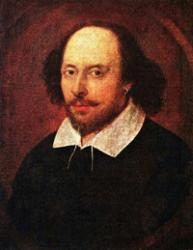 In this full time, all-level program we will read, study and play with eight Shakespearean dramas as well as two written by his contemporaries. Some people read Shakespeare in search of truth; others read him for sheer entertainment. Some people say his works are subversive and use his works to foment change, while others argue that he bolsters stability. Some people make fun of Shakespeare and others are awed by him. Shakespeare is used by comedians, by politicians, by historians and by literary critics. He inspires actors, filmmakers, poets, musicians and authors. Cultures outside of England adapt his plays to their benefit. What makes Shakespeare so useful, so appealing and so popular across the globe and across time? These are some of the issues that we will address in this program. But we will also pay close attention to Shakespeare’s poetry, his imagery and his dramatic techniques through close readings and through short performances of his plays. And we will look at his plays in their literary and historical context.
In this full time, all-level program we will read, study and play with eight Shakespearean dramas as well as two written by his contemporaries. Some people read Shakespeare in search of truth; others read him for sheer entertainment. Some people say his works are subversive and use his works to foment change, while others argue that he bolsters stability. Some people make fun of Shakespeare and others are awed by him. Shakespeare is used by comedians, by politicians, by historians and by literary critics. He inspires actors, filmmakers, poets, musicians and authors. Cultures outside of England adapt his plays to their benefit. What makes Shakespeare so useful, so appealing and so popular across the globe and across time? These are some of the issues that we will address in this program. But we will also pay close attention to Shakespeare’s poetry, his imagery and his dramatic techniques through close readings and through short performances of his plays. And we will look at his plays in their literary and historical context.
We have organized the reading around accumulating themes beginning with gender relations in Taming of the Shrew, a contentious and difficult subject which Thomas Heywood’s A Woman Killed with Kindness will help us explicate. Many of the same issues arise in Much Ado about Nothing and Troilus and Cressida, though Troilus also raises problems about commerce and politics. These reappear in The Merchant of Venice and Measure for Measure, plays that also open up questions about religion in the context of the meaning of justice. In Othello, Shakespeare adds race to the mix of sex and jealousy, while John Ford’s ‘Tis Pity She’s a Whore, by raising the question of incest, pushes matters to an extreme. All comes together in that most open-ended of Shakespeare's plays, Hamlet, the most imitated, most adapted, most USED of any of the plays We will study the many ways in which Hamlet has been portrayed on the stage, in film, and in other creative modes from Shakespeare’s time to our own, in England and abroad. In short, we will end our study playing with Hamlet.
This program will involve serious study and a heavy time commitment. The week will be structured around lectures, seminars, workshops, film showings and student performances. Students will be expected to read the plays at least twice, read a series of critical essays and historical documents, prepare response writings for each seminar, write formal essays, and perform short scenes each week in performance workshops.
Students can expect to develop skills in critical thinking, literary and historical analysis, film studies, performance and writing. They can also expect to learn how to make the most of Shakespeare and to enjoy his plays.
For more information about this program, feel free to email Nancy Taylor, taylorn@evergreen.edu [1]. First year students, especially, should consult with the faculty before registering.
Total: 16 credits.
Enrollment: 48
Program is preparatory for careers and future studies in the humanities, history and theater.
